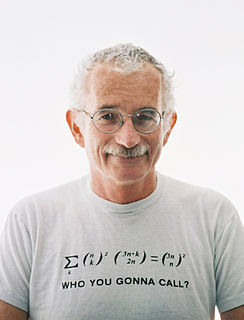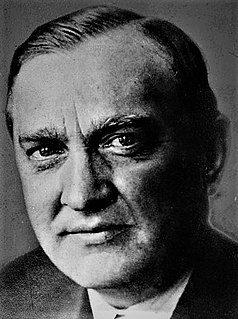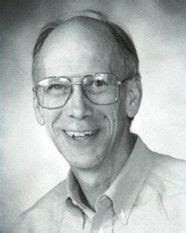A Quote by Doron Zeilberger
Mathematics my foot! Algorithms are mathematics too, and often more interesting and definitely more useful.
Quote Topics
Related Quotes
Mystery is an inescapable ingredient of mathematics. Mathematics is full of unanswered questions, which far outnumber known theorems and results. It's the nature of mathematics to pose more problems than it can solve. Indeed, mathematics itself may be built on small islands of truth comprising the pieces of mathematics that can be validated by relatively short proofs. All else is speculation.
I don't want to convince you that mathematics is useful. It is, but utility is not the only criterion for value to humanity. Above all, I want to convince you that mathematics is beautiful, surprising, enjoyable, and interesting. In fact, mathematics is the closest that we humans get to true magic. How else to describe the patterns in our heads that - by some mysterious agency - capture patterns of the universe around us? Mathematics connects ideas that otherwise seem totally unrelated, revealing deep similarities that subsequently show up in nature.
When the mathematician says that such and such a proposition is true of one thing, it may be interesting, and it is surely safe. But when he tries to extend his proposition to everything, though it is much more interesting, it is also much more dangerous. In the transition from one to all, from the specific to the general, mathematics has made its greatest progress, and suffered its most serious setbacks, of which the logical paradoxes constitute the most important part. For, if mathematics is to advance securely and confidently, it must first set its affairs in order at home.
To criticize mathematics for its abstraction is to miss the point entirely. Abstraction is what makes mathematics work. If you concentrate too closely on too limited an application of a mathematical idea, you rob the mathematician of his most important tools: analogy, generality, and simplicity. Mathematics is the ultimate in technology transfer.
You can keep counting forever. The answer is infinity. But, quite frankly, I don't think I ever liked it. I always found something repulsive about it. I prefer finite mathematics much more than infinite mathematics. I think that it is much more natural, much more appealing and the theory is much more beautiful. It is very concrete. It is something that you can touch and something you can feel and something to relate to. Infinity mathematics, to me, is something that is meaningless, because it is abstract nonsense.
A number of aspects of mathematics are not much talked about in contemporary histories of mathematics. We have in mind business and commerce, war, number mysticism, astrology, and religion. In some instances, writers, hoping to assert for mathematics a noble parentage and a pure scientific experience, have turned away their eyes. Histories have been eager to put the case for science, but the Handmaiden of the Sciences has lived a far more raffish and interesting life than her historians allow.
Mathematics is much more than computation with pencil and a paper and getting answers to routine exercises. In fact, it can easily be argued that computation, such as doing long division, is not mathematics at all. Calculators can do the same thing and calculators can only calculate they cannot do mathematics.
I don't think that everyone should become a mathematician, but I do believe that many students don't give mathematics a real chance. I did poorly in math for a couple of years in middle school; I was just not interested in thinking about it. I can see that without being excited mathematics can look pointless and cold. The beauty of mathematics only shows itself to more patient followers.



































